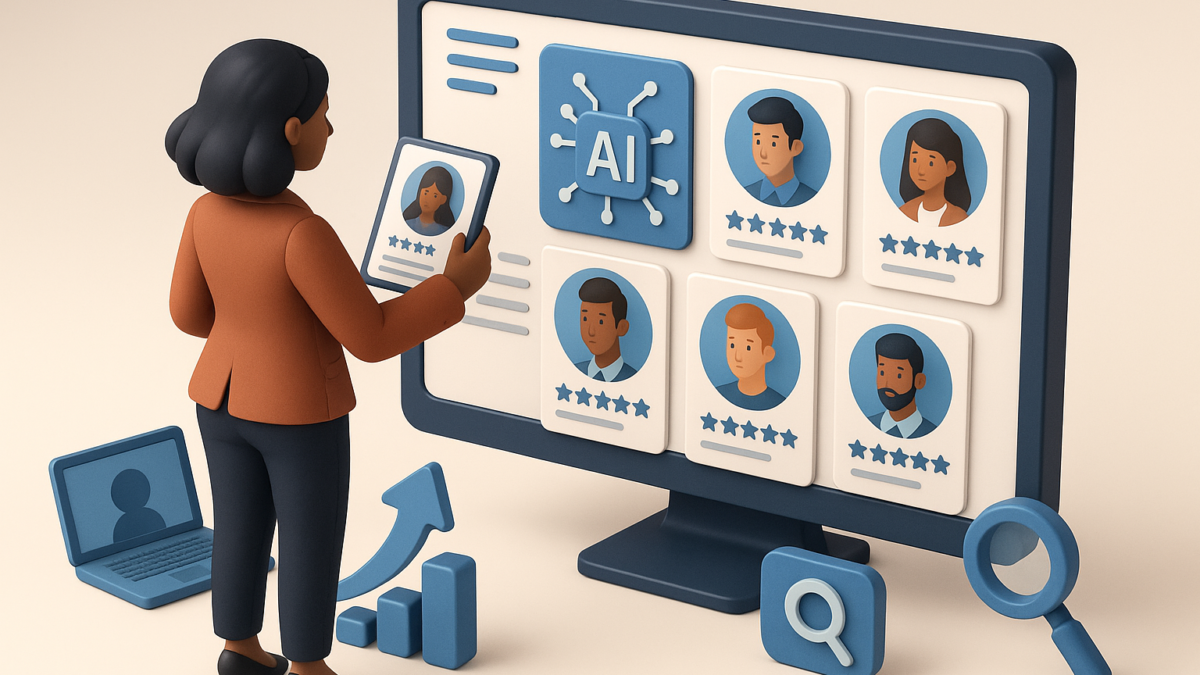The Rise of AI-Powered Recruitment: How HR Tech Is Redefining Hiring in 2025
Table of Contents
Hiring the right talent has always been one of the biggest challenges for businesses. From managing hundreds of resumes to coordinating interviews, traditional recruitment processes are often slow, costly, and biased. In 2025, however, the rise of AI-powered recruitment tools is reshaping the HR technology landscape.
AI is no longer just a back-office tool it’s becoming a frontline partner in hiring. From resume screening to candidate engagement, AI-powered systems are enabling HR teams to work smarter, reduce time-to-hire, and improve the overall candidate experience.
Why Traditional Hiring Is Broken
Even before AI, companies struggled with recruitment inefficiencies.
- High Application Volume: Job postings often attract hundreds (or thousands) of resumes, making manual screening impossible.
- Bias and Inconsistency: Human recruiters, despite best efforts, may let unconscious biases influence decisions.
- Long Time-to-Hire: Delayed processes frustrate both candidates and hiring managers.
- Poor Candidate Experience: Generic communication and long waiting periods harm employer branding.
Clearly, the old ways of hiring are no longer sustainable in today’s fast-paced market.
How AI Is Transforming Recruitment in 2025
1. Smarter Resume Screening
AI-powered applicant tracking systems (ATS) automatically scan resumes and match skills to job descriptions, cutting screening time dramatically.
2. AI Chatbots for Candidate Engagement
Virtual assistants answer FAQs, schedule interviews, and even conduct initial screening conversations, providing real-time communication.
3. Predictive Analytics for Talent Retention
AI can forecast candidate success and predict turnover risk by analyzing historical data and behavioral patterns.
4. Video Interview Intelligence
AI analyzes tone, language, and facial expressions during recorded interviews to assess soft skills and cultural fit.
5. Job Description Optimization
Generative AI writes unbiased, inclusive job descriptions that attract diverse candidates.
Top AI Recruitment Tools in 2025
1. LinkedIn Talent Insights
Uses AI to analyze talent pools, competitor hiring trends, and candidate skills to inform better hiring strategies.
2. HireVue
Provides AI-powered video interview assessments, analyzing speech and communication patterns.
3. Pymetrics
Uses neuroscience-based games and AI to match candidates to roles based on cognitive and emotional traits.
4. Paradox Olivia
An AI recruiting assistant that automates scheduling, screening, and candidate Q&A.
5. Zoho Recruit AI
A cost-effective ATS with built-in AI features for resume parsing and candidate ranking.
Benefits of AI-Powered Recruitment
- Faster Time-to-Hire: Automation shortens recruitment cycles.
- Reduced Bias: AI models help minimize human bias in shortlisting.
- Improved Candidate Experience: Real-time responses keep candidates engaged.
- Higher Accuracy: Better matching of candidates to roles reduces turnover.
- Cost Savings: Less manual work for HR teams reduces overhead.
Challenges and Concerns
1. Data Privacy
Recruitment AI tools rely on personal data, raising privacy and compliance concerns.
2. Algorithmic Bias
If trained on biased datasets, AI may unintentionally reinforce inequalities.
3. Lack of Human Touch
Over-reliance on automation can make the process feel impersonal.
4. Transparency Issues
Candidates may not understand how AI decisions are made, leading to trust concerns.
The Future of AI-Powered Recruitment
Looking ahead, AI will continue to evolve recruitment in exciting ways:
- Hybrid Hiring Models: A mix of AI-driven automation and human judgment for fairness and empathy.
- AI-Powered Cultural Fit Assessments: Tools will go beyond skills to predict team compatibility.
- Generative AI for Employer Branding: Automated creation of personalized career site content and recruitment marketing campaigns.
- Voice and Emotional AI: Advanced systems capable of detecting stress, enthusiasm, or confidence during interviews.
By 2030, recruitment could become a seamless blend of AI efficiency and human empathy, where machines handle repetitive tasks and humans focus on relationship-building.
Conclusion
AI-powered recruitment is no longer a futuristic concept—it’s here, and it’s transforming HR in 2025. From automated screening to predictive analytics, AI helps companies hire faster, smarter, and fairer.
For businesses, the key is balance: leveraging AI to reduce inefficiencies while maintaining the human connection candidates expect. Companies that get this balance right will not only fill roles faster but also build stronger, more diverse teams for the future.
See Also:From Content Asset to Conversion Hub: Why Portals Are the New Landing Pages





